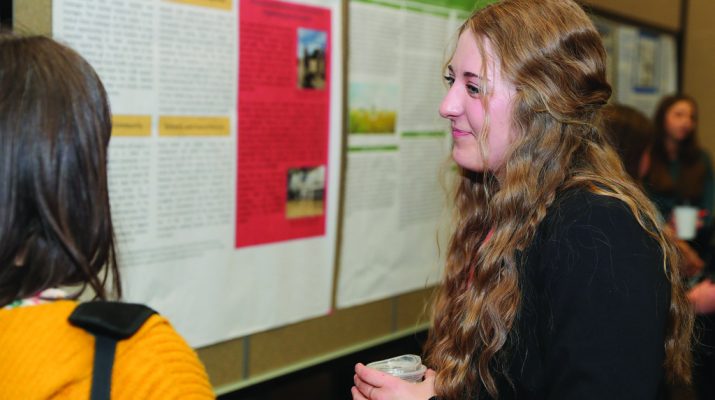What is Dawn Simon’s favorite part of Research Day?
The University of Nebraska at Kearney faculty member can answer that question without hesitation.
“Talking to students, for sure. I love looking at their posters and listening to them explain the work they’ve done,” said Simon, a biology professor and director of undergraduate research and creative activity on campus. “And it’s really fun for me to learn about subjects that I’m less familiar with, outside my own discipline.”
An organizer and judge for the event, Simon is always impressed by the high-level research UNK students are conducting alongside their faculty mentors. She called this year’s group “exceptionally strong.”
“It seems like the research projects are getting more sophisticated, with more complicated results to interpret,” she said. “I don’t know how we’re going to separate the prizes this year, because all the students are doing a great job.”
In its 26th year, Research Day is a campuswide celebration highlighting the creative and scholarly work produced by Lopers. Nearly 200 undergraduate and graduate students from a variety of academic programs participated in the event, proving that research really is for everyone.
“Every UNK student who wants this opportunity can have this opportunity,” Simon said.
Through oral and poster presentations, UNK students showcased their knowledge in a wide range of subject areas, from Nebraska history and U.S. foreign policy to agriculture, health care and wildlife.
Juliana Merrihew, a freshman from Hyannis, presented the project she’s working on through the Undergraduate Research Fellows program, which provides a $1,200 annual stipend to participating students. Under the mentorship of political science professor Peter Longo, she’s studying place-based education and the benefits it can bring to rural Nebraska schools.
“I come from a really tiny school, so I’ve been able to see firsthand some of the challenges that rural schools face,” Merrihew said. “A lot of times people suggest consolidation as the solution, but my research shows that isn’t beneficial. It’s actually more harmful. Instead, as an alternative, I’m suggesting place-based education, which focuses on connecting students with their community.”
Place-based education immerses students in local history, culture and landscapes and encourages them to create connections with other community members. These “empowering opportunities” help students find meaning in their studies and strengthen the bond they have with their hometown, according to Merrihew.
“A lot of times rural schools are overlooked because they’re smaller and they may not have as many resources or opportunities, but I think they provide a lot of value and they can be really successful and positive for students if we’re willing to invest in them,” she said.
In addition to Undergraduate Research Fellows, Merrihew is part of the UNK Honors Program and Kearney Law Opportunities Program, which provides scholarships, academic support and professional development for students from rural Nebraska who will practice in these communities as attorneys.
Undergraduate research is a “great opportunity” for the political science major to prepare for law school and her future career.
“I feel like there are a lot of good skills you can develop from it,” Merrihew said. “Plus, it gives me a chance to dive deeper into something I’m interested in and meet other students and faculty on campus.”
Simon believes undergraduate research is beneficial for any student, regardless of their major or professional plans.
“No matter what a student does for a career, it is valuable to learn how to think critically, communicate clearly and accept feedback in a positive way,” she said. “Those overarching skills are important for anybody.”
Research also helps students gain confidence and identify interests that can lead to a specific career path, she added.
Dayana Hernandez chose a topic that applies directly to her job.
A senior in the interior and product design program, Hernandez is currently interning with Wilkins ADP in Kearney. She’ll start working full time for the architectural, design and planning firm after graduating in May.
“When we work with a client, they’re going to have this new space and it needs to be welcoming while representing their brand and image,” Hernandez said. “That’s where I come into play.”
For her research project, the Grand Island native looked at interior design elements in retail settings and how they influence consumer behavior and shopping habits. The store layout, flooring, lighting, furniture, color scheme and overall ambiance can all impact a customer’s experience and desire to frequent a specific location, according to Hernandez.
“This is important for businesses because they’re looking to attract customers and generate more sales,” she said. “These findings can also inform design decisions in other industries, including hospitality, health care and office environments, where creating inviting and functional spaces is essential for promoting user satisfaction and well-being.”
The cross-disciplinary project was guided by Dana Vaux, an associate professor and coordinator of the interior and product design program, with additional assistance from marketing professor Sri Seshadri.
“I’m really excited and passionate about this side of interior design,” Hernandez said. “I feel like my designs got better because I did the research and understand the strategies behind it.”

